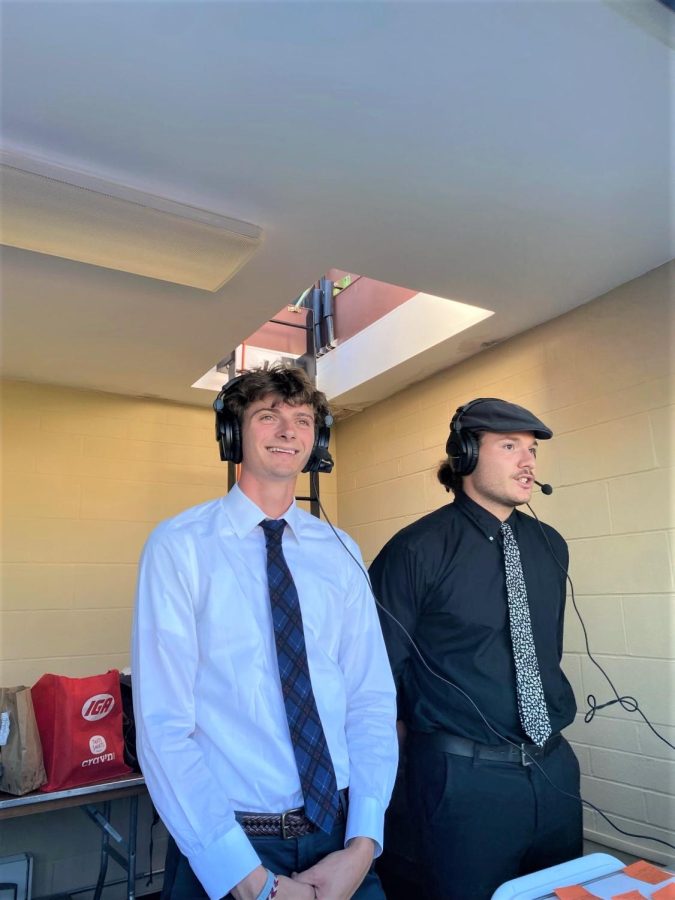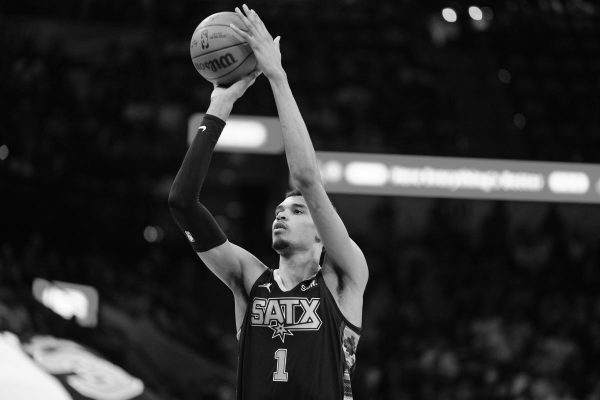Oberlin’s Student Commentators Talk Reviewing Games
Photo courtesy of Jack Povilaitis
Jack Povilaitis and Max Anastasio commentate from the press box.
Maybe you’ve seen them in the press box, dressed up in berets and suits for soccer games, or maybe you’ve recognized their voices on livestreams. For whatever the occasion, you’re watching fourth-years Jack Povilaitis, Max Anastasio, Oliver Ripps, and John Schooner in action as student commentators for Oberlin games.
This past Saturday, YeoCast, a commentating livestream on YouTube, debuted for the men’s basketball away game against Wabash College. The idea behind YeoCast comes from the Manning brothers’ commentary on Monday Night Football games that started during the pandemic. Assistant Director of Athletics for Communications and Compliance Mike Mancini, who also works as Oberlin’s main commentator, wanted to try something similar with away games. During the stream, Anastasio, Povilaitis, and Schooner were dressed up as if they were in the box, only this time they were commentating from their bedrooms and offices. Povilaitis could be seen showing the camera a whiteboard of the court analyzing the players’ moves. However, this system wasn’t completely perfect.
“Dude, we have to do a better job,” Anastasio said to Povilaitis during the broadcast. “You gotta get me on the mic.”
In fact, Povilaitis and Anastasio started commentating on games out of frustration. Living with two men’s soccer players in their second year, they would try to watch whatever games they could to cheer their roommates on. However, during the away game livestreams, the two noticed that the commentators were inexperienced, incorrectly using terminology and misrepresenting basic rules of soccer. They also wanted to provide a better description to casual fans who watch the game but know little about the sport.
The two described commentating as “putting icing on the cake.” Although the audience’s main priority is the game, not the commentary, narrating the actions with expressive, poetic language adds to the overall experience. They each spend a minimum of one hour studying the home and opposing teams’ lineups before the game, writing down every player’s name, year, number, hometown, notable statistics, and any interesting facts on Post-it notes that they bring into the press box. With YeoCast, Povilaitis has been taking the lead because he knows more about basketball than Anastasio, whereas in the fall, Anastasio took the lead with his knowledge in soccer.
Halftime, as they described it, is a time where they can relax but also plan on what they might want to say for the next half of the game.
“During halftime, the two of us reflect about the game,” Povilaitis said. “For 10 or 15 minutes, we’re wondering what [each team is] gonna do next. It’s, like, the biggest thing in the world for us.”
Last year, when Povilaitis had an ultimate Frisbee tournament, he needed someone to step in to take his spot, so he called up his friend Oliver Ripps. Ripps has always been into sports commentating, and as a kid he would mute the TV while narrating for his parents or friends. To him, commentary is an important part of being a fan of the sport — a lot of goals in soccer, for example, are famous not just because of the goal itself, but also because of the call. His favorite sports are basketball and baseball, but since Oberlin has established commentators for those, he says that soccer is the next best thing.
As a College student who isn’t a Division III varsity athlete, Ripps has found ways to get involved with sports. When he’s not running statistical analyses as team manager for the men’s basketball team or in the press box, he’s probably playing pick-up basketball with some Conservatory students in the gym.
It’s always been his dream to become a professional commentator, though he’s not sure if it’s in the cards for now. If there’s an opportunity, he will be taking the offer. He will miss the nerves — getting there before the game, knowing that a lot of people are going to hear his voice over the broadcast.
“I never got my goal call in soccer, but I guess I’ll miss the experience of feeling like you’re part of something professional and creative,” Ripps said. “If anyone is reading this and feels like they’re not able to get involved with sports, I know that coming into this school it was hard to find. There are a lot of opportunities like broadcasting, student photographers, and in terms of managing, [it’s been] awesome. Anyone who’s interested in figuring out what ways you can get involved, the men’s basketball team manager position is open for next year.”
During a women’s soccer game against Chatham University when Povilaitis again could not commentate, he and Anastasio called up another friend, John Schooner, to take the lead in the press box. Schooner learned by example, listening to various commentators and developing an understanding of the flow and essence of commentating. Along with the different perspective on sports that commentating provides, what Schooner will miss the most about commentating is going through the preparation process with Anastasio and Povilaitis, from doing extensive research before the game to discussing new strategies to keep the audience engaged and entertained.
“Commentating a live game is a lot different than just discussing a game casually with friends, but hearing a lot of different commentators when watching sports gave me a decent idea about it,” Schooner said. “It allows you to engage with a game in a different way that you can’t get just from watching it.”
Thanks to the work of all four commentators, spectators get to hear a personalized touch when they listen to games, and so far, it’s been greatly appreciated.
“We would get so many parents thanking us for putting the time in,” Anastasio said.




